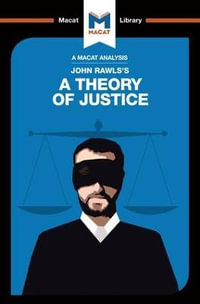
An Analysis of John Rawls's A Theory of Justice
By: Filippo Dionigi, Jeremy Kleidosty
Paperback | 15 July 2017
At a Glance
Paperback
Limited Stock Available
RRP $13.99
$13.35
ISBN: 9781912127849
ISBN-10: 1912127849
Series: The Macat Library
Published: 15th July 2017
Format: Paperback
Language: English
Number of Pages: 96
Audience: General Adult
Publisher: Macat International Limited
Country of Publication: GB
Dimensions (cm): 19.8 x 12.9 x 0.51
Weight (kg): 0.1
Shipping
| Standard Shipping | Express Shipping | |
|---|---|---|
| Metro postcodes: | $9.99 | $14.95 |
| Regional postcodes: | $9.99 | $14.95 |
| Rural postcodes: | $9.99 | $14.95 |
How to return your order
At Booktopia, we offer hassle-free returns in accordance with our returns policy. If you wish to return an item, please get in touch with Booktopia Customer Care.
Additional postage charges may be applicable.
Defective items
If there is a problem with any of the items received for your order then the Booktopia Customer Care team is ready to assist you.
For more info please visit our Help Centre.
You Can Find This Book In
MACAT Library
This product is categorised by
- Non-FictionLawLaws of Specific JurisdictionsConstitutional & Administrative LawHuman Rights & Civil Liberties Law
- Non-FictionPolitics & GovernmentPolitical Science & Theory
- Non-FictionPsychologyPsychological Theory, Systems, Schools of Thought & Viewpoints
- Non-FictionLiterature, Poetry & PlaysHistory & Criticism of LiteratureLiterary Theory
- Non-FictionSociology & AnthropologySociology
- Non-FictionPhilosophy
- Non-FictionSociety & Culture
- Non-FictionEducationGeneral Study & Learning Skills
- BargainsNon-Fiction BargainsLaw Bargains
- BargainsNon-Fiction BargainsLiterature, Poetry & Plays Bargains
- BargainsAcademia & Knowledge Bargains
- BargainsNon-Fiction BargainsPhilosophy Book Bargains
- BargainsNon-Fiction BargainsHistory Bargains


